Honorary doctorates
Franciszek Ziejka
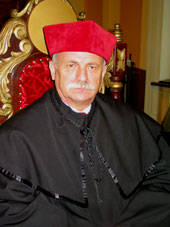
Franciszek Ziejka - an outstanding scholar of the middle generation, and at the same time an accomplished organiser of academic life in Poland and at the Jagiellonian University. The scholarly output of Professor Franciszek Ziejka is extensive and significant, if only to cite such studies as "W kręgu mitów polskich" (Eng. In the circle of Polish myths), "Złota legenda chłopów polskich" (Eng. The golden legend of Polish peasants). The collaboration with French libraries during his many years on the Seine resulted in interesting books: "Stosunki polsko - prowansalskie" (Eng. Polish - Provençal relations) and "Paryż młodopolski" (Eng. Paris of the Young Poland).
Professor Franciszek Ziejka was the Rector of the Jagiellonian University for two terms, the President of the Rector's College of Higher Education in Kraków, and the President of the Conference of Rectors of Academic Schools in Poland.
He received an honorary doctorate from the Świętokrzyska Academy in Kielce on 30 September 2004.
Henryk Samsonowicz
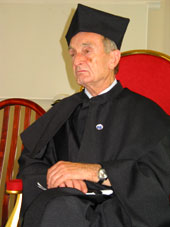
Henryk Samsonowicz - is one of the most eminent Polish historians. An intellectual, scholar and master of several generations of adepts of Clio, continuously, from the beginning of his professional path, connected with Warsaw and the University of Warsaw. The bibliography of the Professor's works to date totals almost 800 items.
In practice, Professor Henryk Samsonowicz combines research work with university teaching and organisational - scientific activities in a unique manner. A great page was written by the Professor as an activist for the historical community in the Polish Scientific Society.
Professor Henryk Samsonowicz was the first Minister of National Education in the Third Republic of Poland ( 1989 - 1990).
He received an honorary doctorate from the Świętokrzyska Academy in Kielce on 24 June 2005.
Wiesław Myśliwski
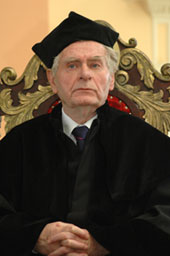
Wiesław Myśliwski - one of the most outstanding contemporary Polish writers. For forty years now, each of his new books has become a literary and cultural event, attracting the attention of readers and critics, being commented on, discussed and often - awarded.
He received an honorary doctorate from the Świętokrzyska Academy in Kielce on 17 May 2007.
Stanisław Bylina
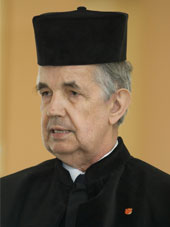
Stanisław Bylina - is one of the most eminent Polish medievalists and distinguished persons for the development of science. His multifaceted circle of research and scientific interests relates not only to the history of Poland and Central and Eastern Europe, but also to Western Europe. The subject of his many years of research was reform movements with varied programmes and varying degrees of radicalism, as well as movements consistently condemned by the Church as heretical. Remaining faithful to his interest in the currents of religious contestation, Professor deals with the Hussite movement, its factions, the issue of internal controversies in this movement and its influence in Poland. In his recently published next book , "Na skraju lewicy husyckiej" (Eng. On the edge of the Hussite left-wing), the Professor presented the genesis and functioning of the Picards, the Taborite sect that formed the revolutionary phase of the Hussite movement. In the field of hussitological research, the Professor is one of the world leaders.
He received an honorary doctorate from the Jan Kochanowski University of Humanities and Natural Sciences in Kielce on April 30, 2009.
Tadeusz Różewicz
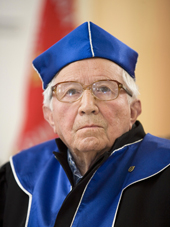
Tadeusz Różewicz - born on 9 October 1921 in Radomsko. He was passionate about literature from an early age, reading numerous literary magazines such as: "Pion", "Wiadomości literackie", "Kuźnia Młodych", "Skamander" or "Okolica Poetów". His first publications were created while studying at the Social Secondary School of Feliks Fabiański in Radomsko. In 1939, one of his poems appeared in the monthly magazine "Wymiary". In the same year, he made his debut not only as a poet, but also as a literary critic, as "Czerwone Tarcze" published his article proclaiming the victory of the avant-garde entitled: "Poezja jadalna czy niejadalna" (Eng. Edible or inedible poetry).
He received an honorary doctorate from the Jan Kochanowski University of Humanities and Sciences in Kielce on 25 June 2009.
Wojciech Wrzesiński
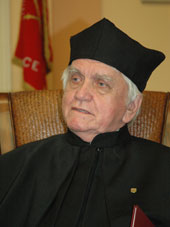
Wojciech Wrzesiński - was born in 1934 in Krzywosąda in the Kuyavia region, into an intellectual family with independence and Catholic traditions. The village is commemorated in the pages of our history as a place of bloody battles during the January Uprising. He obtained his baccalaureate at the well-known high school in Aleksandrów Kujawski, run by the Salesian priests and famous for its very high standard. He studied history at the Nicolaus Copernicus University in Toruń, where professors Karol Górski and Witold Łukaszewicz had a significant influence on his future research work and intellectual formation.
Professor Wojciech Wrzesiński conducts scientific research, dealing with diverse, generally new, difficult and controversial issues in the field of contemporary history. With his rich output, he made a lasting contribution to the development of historical writing in Poland and achieved a high professional standing and unquestionable authority as a scholar and researcher. The Professor is an eminent scholar, a historian specialising in recent history and political thought of the 19th and 20th centuries. He is the author of almost 800 publications, most of which have been translated into foreign languages.
He received an honorary doctorate from the Jan Kochanowski University of Humanities and Natural Sciences in Kielce on 24 June 2010.
Ewa Lipska
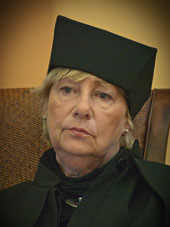
Ewa Lipska - one of the most eminent contemporary Polish poets, whose literary oeuvre significantly functions in the bloodstream of Polish and European culture. She studied painting at the Academy of Fine Arts in Krakow, but fortunately for Polish literature, she decided to pursue poetry. She debuted as a 16-year-old in "Gazeta Krakowska" with the poems "Krakowska noc", "Smutek" "Van Gogh". Anthologies of Ewa Lipska's poems are published in nearly forty foreign language editions in fifteen languages, including such exotic ones as Catalan and Albanian. The multilingual books, articles, essays, dissertations and reviews of Ewa Lipska's work to date already constitute a substantial library, which grows on an almost daily basis. The poet's many Polish and international distinctions, honours and literary awards include awards, Polish and Austrian, of PEN-clubs, Kościelski award, City of Kraków award, Wawrzyn Literacki for "the best book of 2002" ("Sklepy zoologiczne"), Silver Medal for Merit to Culture Gloria Artis and many others. It is also worth noting here that Ms Ewa Lipska's repeated participation in international poetry festivals throughout almost all of Europe and in the USA. Between 1991 and 1997, the poet headed the Polish Institute in Vienna, acting as an ambassador for Polish culture and literature.
She received her honorary doctorate from the Jan Kochanowski University in Kielce on 21 June 2012.
Andrzej Białas
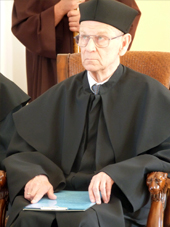
Andrzej Białas - born on 26 July 1936. He is a theoretical physicist working on the theory of elementary particles and the phenomenology of heavy-ion collisions, president of the Polish Academy of Arts and Sciences. He is the author of numerous publications containing new research directions in high-energy physics. His results on the analysis of multi-particle correlations and fluctuations of particle distributions are among the most well-known and important. His outstanding work "Moments of Rapidity Distributions as a Measure of Short-Range Fluctuations in High-Energy Collisions" has been cited many times in the literature, he introduced a completely new perspective on the importance of correlation functions when describing particle production in elementary collisions and heavy ions and fragmentation of atomic nuclei. Professor Andrzej Białas is involved in extensive cooperation with many research centres in the country and abroad, resulting in the dynamic development of high energy physics in Poland. His position and scientific achievements enabled the development of many young Polish physicists. The Professor combines scientific and organisational qualities. He is one of the main creators of the Krakow school of phenomenology and particle physics theory. He was also one of the initiators and is still co-organizer of the Cracow School of Theoretical Physics. Professor Bialas has been repeatedly awarded for his outstanding scientific achievements. He received, among others, the Smoluchowski Medal in 2003, which is the most important award of the Polish Physical Society, and in 2009 the Prime Minister's Award.
He received his honorary doctorate from the Jan Kochanowski University in Kielce on 20 June 2013.
Walery Pisarek
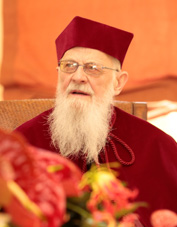
Walery Pisarek - born on 31 May 1931. Outstanding linguist and press scholar, specialist in the theory of information and mass communication, organiser of scientific life, untiring populariser of knowledge. A master of many generations of polonists and journalists, a man of particular merit to Polish science and culture. He is the author of more than 20 books, almost 700 articles and reviews that were published in Poland and abroad. He initiated the enactment of the "Act on the Polish Language", the first legal act in history to sanction the importance of the Polish language in the life of the nation and confirm the need to care for it in public life. An erudite man whose thoughts could function as sentences, such as this one taken from the book "Słowa między ludźmi" (Eng. Words Between People): "Learning to use language effectively must begin with learning to be silent. Those who have not learnt to keep silent should not speak out at all, because sooner or later they will make trouble for themselves or others". Respect and appreciation are also due to Professor's patriotic and moral attitude. Arrested at the age of 16 for pro-independence activities and sentenced to five years (granted amnesty). Arrested again in 1951 for "attempting to change the Polish state system by violence". During his six-year sentence, he worked as a miner in Brzeszcze and Borek.
The Professor has received numerous awards and distinctions, including Silesian Literary Laurel (2002), Merit to the Polish Language (2012). He received the honorary doctorate from the Jan Kochanowski University in Kielce on 5 June 2014.
Andrzej Markowski
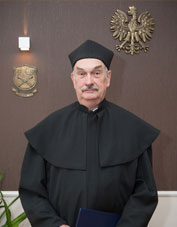
Andrzej Markowski - born on 27 November 1948 . He is a linguist, a humanist, of merit to Polish national culture, and one of Poland's best-known linguists.
Graduate and lecturer at the University of Warsaw; in 1990 he was awarded a postdoctoral degree, in 1996 - the title of full professor.
He has performed or continues to perform many important functions for Polish linguistics and Polish culture. Since 2000, he has chaired the Council for the Polish Language at the Presidium of the Polish Academy of Sciences (in 1996-2000 he was its deputy chairman), and since 2007 he has been deputy chairman of the Committee for the Standardisation of Geographical Names beyond the Borders of the Republic of Poland. He is a member of many bodies: Presidium of the Committee on Linguistics of the Polish Academy of Sciences (since 2011), Committee on Literary Languages of the International Committee of Slavists, editorial board of "Przeglad Humanistyczny", editorial board of "Poradnik Językowy", programme board of the Director of the Central Examination Commission, Warsaw Scientific Society (from 2007 to 2010 deputy secretary general of this society). He was also the long-standing director of the Institute of Polish Language at the University of Warsaw - a post he held for 15 years (1991-1999 and 2005-2012).
Professor Andrzej Markowski popularises beautiful and correct Polish. His research interests focus on lexical semantics, lexicology, lexicography and language culture.
He has published 41 books and more than 180 scientific articles and several hundred popular science columns. Many of his works have permanently entered the heritage of Polish linguistics, Adjectival antonyms in contemporary Polish to so many other types of lexical oppositions (1986), Lexicon common to different varieties of the Polish language (1992), Polish language culture. Theory. Lexical issues (2006).
He received an honorary doctorate from the Jan Kochanowski University in Kielce on 11 June 2015.
Tomasz Schramm
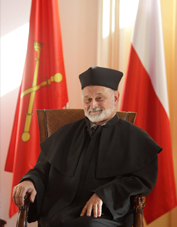
Tomasz Schramm - born in Poznań in 1949.
Historian specialising in the time of the turn of the 20th century, the First World War: its background, nature and consequences, and the changes that took place in Europe. His academic work deals with Polish - French relations. He is also interested in Europe as a whole and its historical and cultural identity. His academic career has been associated with the Adam Mickiewicz University in Poznań, and the history of this university is part of the professor's research interests. Member of the presidium of the Polish Historical Society, honorary consul of the French Republic, member of "Solidarność" in the 1980s, member of the exclusive The Explorers Club. The most important publications are: "French Military Missions in Central European Countries 1919-1938", "Winning Poland 1914-1918" in the series "History of the Polish State and Nation", "General History - 20th Century" in the series "Understanding history", "Divisions of Europe in the 20th century" "Borders and divisions of Europe", "Determinants of Polish identity on the verge of regaining independence", "What were France and Germany for Poland in the 19th century?", "Europe's identity and Christianity".
The ceremony conferring the honorary doctorate of the Jan Kochanowski University in Kielce on Professor Tomasz Schramm took place on 17 March 2016.
Zoltán Kövecses
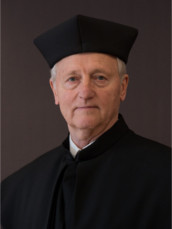
Zoltán Kövecses- born on 23 September 1946 in Budapest. He is an eminent cognitive linguist and professor of linguistics at the Faculty of American Studies of Eötvös Loránd University in Budapest. In his dissertations, prof. Zoltán Kövecses addresses issues related to the specifics of how we think about the world, with metaphor, the conceptualisation of emotions, idiomaticity, American slang and the American variety of English. Zoltán Kövecses' research interests focus primarily on the linguistic concept of metaphor and the relationship between language, mind and culture. The works of prof. Zoltán Kövecses inspire the common linguistic thought worldwide, and are published in English in prestigious publishing houses. It is worth mentioning the most famous dissertations: "Language, Mind, and Culture. A Practical Introduction", 2006, Oxford University Press (published in Poland: "Język, umysł, kultura. Praktyczne wprowadzenie", 2011, Universitas); "Metaphor in Culture. Universality and Variation", 2005/2012, Cambridge University Press; "Metaphor. A Practical Introduction", 2002/2010, Oxford University Press; "Metaphor and Emotion", 2000, Cambridge University Press; "Emotion Concepts", 1990, New York and Berlin: Springer-Verlag; "The Language of Love", 1988, Lewisburg, PA: Bucknell University Press. Zoltán Kövecses is also the author of dictionaries (Hungarian-English, English-Hungarian and others) for which he received the Quality Award in 2000 and the Professor László Országha Award in 2004. The universal achievements of prof. Zoltán Kövecses is held in high regard worldwide. The scientist also participates in the scientific life of Polish cognitive science circles by cooperating with linguists from renowned academic centres.
He obtained the title of Doctor Honoris Causa of the Jan Kochanowski University in Kielce on 24 March 2017.
Andrzej Kajetan Wróblewski
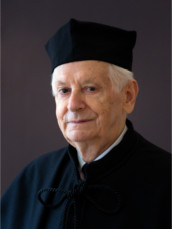
Andrzej Kajetan Wróblewski- born on 7 August 1933 in Warsaw. He is an eminent physicist, a researcher in particle physics and the history of physics, and a postdoctoral professor. He graduated from the High School of Władysław IV in Warsaw, and in 1955 he studied physics at the Faculty of Mathematics and Physics of the University of Warsaw. He has worked there since 1954. In 1961, he defended his doctoral dissertation "As tudy of Λ0 hyperons using the nuclear emulsion method" under the supervision of prof. Marian Danysz. In 1964, he was awarded a postdoctoral degree on the basis of his dissertation "Production of strange particles in π--p interactions at 10 GeV". He was awarded the title of associate professor in 1971 and full professor in 1979. Andrzej Kajetan Wróblewski is the author of more than 200 publications in leading physics journals, which charted new research directions in the field of high energy physics. The so-called Wróblewski formula, the relationship between the average number of particles produced and the dispersion of that number, has passed into the canon of the physical sciences. He is the author of popular science articles and books on the history of science, including the unique monograph "History of Physics. From the earliest times to the present day" (2006) about the paths of development of physics - from ancient civilisations to the latest developments. Andrzej Kajetan Wróblewski has made a huge contribution to higher education in Poland. He served as Dean of the Faculty of Physics at the University of Warsaw (1986-1989) and then as Rector of that university (1989-1993). He was actively involved in matters concerning the organisation of Polish science, and was active in such institutions as the Conference of Rectors of Academic Schools in Poland and the Scientific Research Committee. He has participated in the work of many scientific organisations, including the International Union of Pure and Applied Physics, the C11 Cząstek i Pół Committee (1976-1982); Scientific Policy Committee of CERN (1994-1999); Scientific Council of DESY (1992-1999). He is a full member of the Polish Academy of Sciences and Deputy President of the Polish Academy of Arts and Sciences (since 2009).
Prof. Andrzej Kajetan Wróblewski received an honorary doctorate from the Jan Kochanowski University in Kielce on 22 June 2017
Zbigniew Puchalski
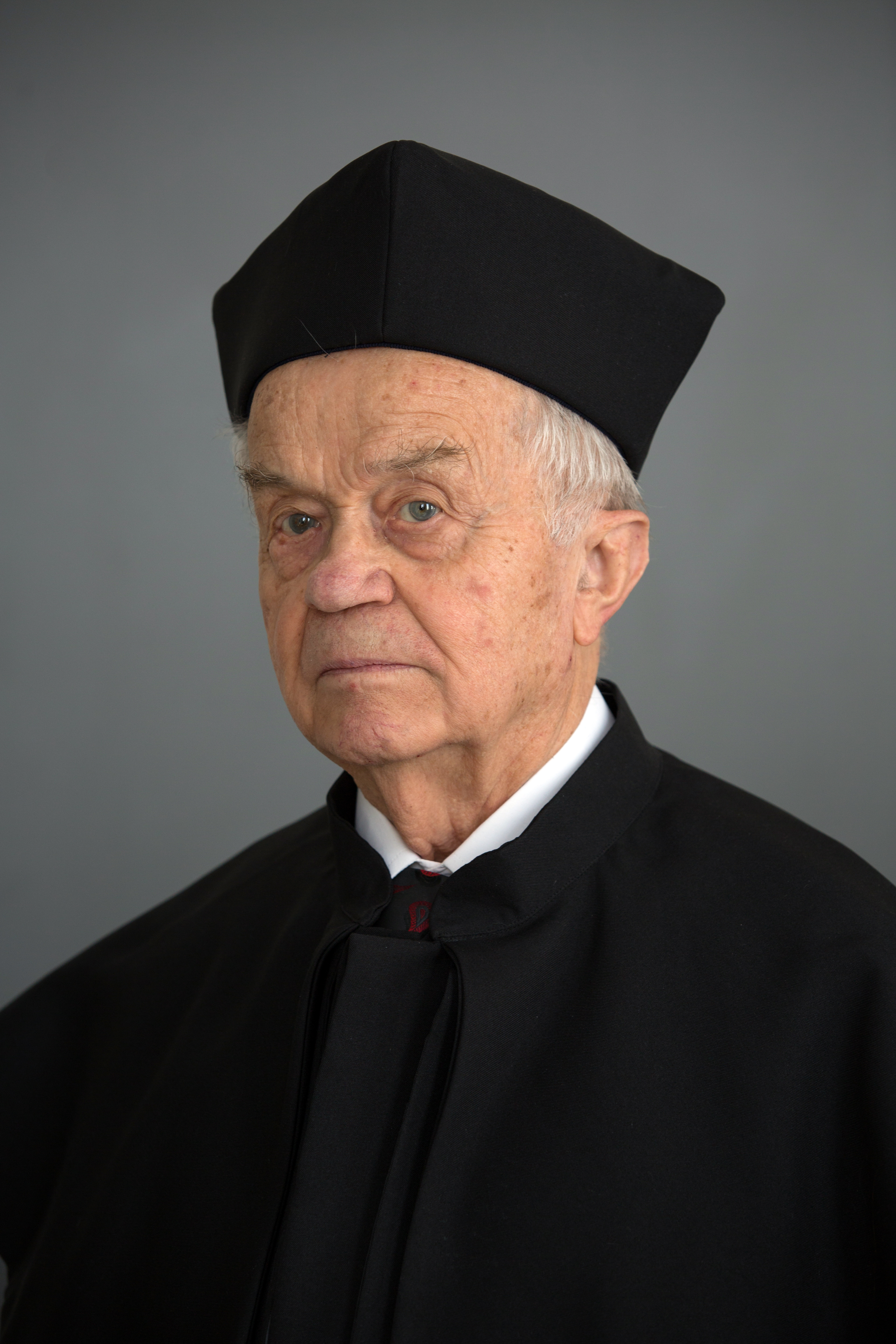
Zbigniew Puchalski - born on 20 December 1933 in Białystok. He is an eminent surgeon and didactician and former rector of the Medical University of Bialystok. The Professor's scientific interests are mainly in endocrine, gastroenterological and oncological surgery. For 28 years (since 1976) he headed the 1st Clinic of General and Endocrine Surgery at the Medical University of Białystok, making it one of Poland's leading surgical centres for endocrine surgery, gastrointestinal surgery and oncological surgery. The scientific and therapeutic achievements of Professor Puchalski and his Team regarding the particularly difficult problem of acute pancreatitis are widely known. From November 2004, he worked at the Surgical Department of the Voivodeship and the Integrated Hospital in Białystok for over five years. For over 50 years of work at the Medical Academy, he actively participated in the didactic activities of the University, who was the rector (in 1987-1990 and 1999-2002). The professor was the chairman of the Rector's Conference at the Medical University; a member of the Presidium of the Rector's Conference at the Academic Schools of Polish Studies; a member of the Presidium of the Scientific Council at the Ministry of Health; regional consultant in general surgery. He has many decorations and distinctions, including: Commander's Cross, Officer's Cross and Knight's Cross of the Order of Polonia Restituta; Order of St. Mary Magdalene of the 1st degree; Gold Olympic Badge; Golden Badge "Distinguished Activist of Physical Culture"; Golden Badge of AZS' Golden Badge "For Merit to Bialystok Region"; awarded with numerous scientific and teaching awards. Min. of Health and the Rector of the AMB, the Medal of Ludwik Rydygier, the Silver Medal of Ludwik Rydygier for "Outstanding Merits for Polish Surgery and the Society of Polish Surgeons". He is the author or co-author of 625 congress papers and communiqués, including 156 published in foreign-language congress magazines and memoirs, and 25 chapters in textbooks.
He obtained the title of Doctor Honoris Causa of the Jan Kochanowski University on 22 March 2018.
Jerzy Wyrozumski
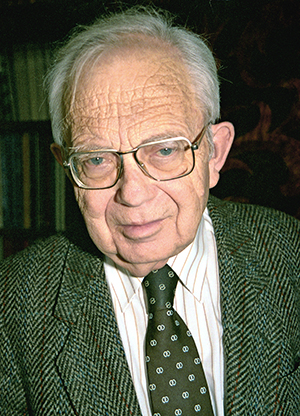
Born in 1930 in Trembowla, he managed to attend school in Lviv before the war. He spent the years of occupation in Trembomla, and at the beginning of 1945 he and his family left for the West. In 1950 he entered the Jagiellonian University and became a historian. Associated with the university for years, he was also a historian of Krakow. He received his doctorate in 1963 for a dissertation on Malopolska weaving in the late Middle Ages. The habilitation was related to the master's degree, but presented in particular the state salt economy up to the end of the 14th century. The associate professorship came in 1981 and the full professorship in 1993.
The Professor's oeuvre comprises about 600 items. He elaborated on the history of medieval Poland when, in 1999, a team of Krakow researchers prepared The Great History of Poland. From the works encompassing very extensive research horizons, it is necessary to recall the monumental History of Krakow. Another field of the scholar's activity became the Polish Academy of Arts and Sciences, which was reactivated in 1989. He became an active member and served as its Secretary General from 1994 to 2015.
Professor Jerzy Wyrozumski did not manage to receive the title in person. He died on 2 November 2018. A delegation from the Jan Kochanowski University handed over the title to the professor's next of kin.
Wiktoria Śliwowska
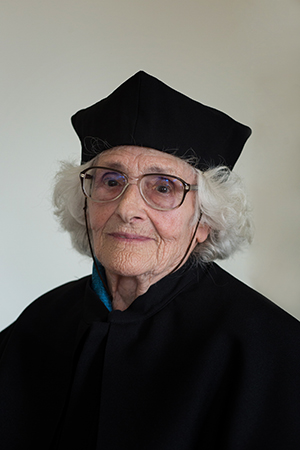
She was born in 1931 in Warsaw. In the years 1949-1953 she studied at the State Pedagogical Institute of Alexander Herzen in Leningrad. After completing her studies, she began working at the Institute of History of the Polish Academy of Sciences in Warsaw, where in 1960 she defended her doctoral thesis entitled "The Pietraszow Case" under the supervision of Professor Stefan Kieniewicz, and in 1971 she received the degree of habilitated doctor on the basis of the thesis entitled "In the Circle of the Predecessor" in Herzen. In 1994, Wiktoria Sliwowska was awarded the title of Professor of Humanities.
Professor Wiktoria Śliwowska is an outstanding historian. She has several hundred publications to her credit, including dozens of books, some of which have been translated into Russian, German, English and Spanish. Her main interests are the history of Russia in the 19th century, the "Polish Siberia", both in the dimension of the 19th-century deportations of participants of independence movements, as well as in its eerie extension of the times of the Stalinist gulags. At the beginning of the 90s the professor undertook efforts to create a file of participants in the January Uprising exiled to Siberia, and in parallel prepared a biographical dictionary of those exiled to Siberia between 1815 and 1856. Another strand of research that she undertakes is related to personal experiences of World War II and the Holocaust. It was Prof. Wiktoria Śliwowska who collected the accounts of Jewish children who were survivors of the Second World War and thus created the publication "Children of the Holocaust Speak" (1993), which was translated into several Western languages. Professor Wiktoria Śliwowska was involved in the work of the Committee of Polish and Russian Historians, functioning within the Polish Academy of Sciences and the Russian Academy of Sciences. From 1998 to 2008 she chaired the deliberations of this body.
She has received many awards for her outstanding and comprehensive scientific achievements. In 2003, she was awarded the Officer's Cross of the Order of Polonia Restituta by the President of the Republic of Poland.
The title ceremony took place on 25 April 2019 at the JKU Rector's Office.
Peter Seyboth
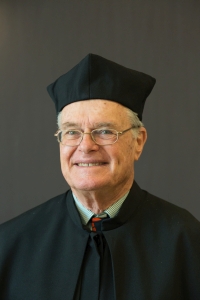
Outstanding physicist and experimenter. He supervised three experimental programmes at the European Organisation for Nuclear Research (CERN) near Geneva. He invited Polish physicists, including a group of scientists from the Jan Kochanowski University, to collaborate at CERN.
He has been associated with our university for over 10 years, when he became a visiting professor at the Department of Nuclear Physics of the Institute of Physics. The origins of his collaboration with Polish scholars in general go back to the mid-1970s. The laudation was delivered by the German scientist's colleague, prof. Marek Gaździcki. As prof. Gaździcki said - Dr Peter Seyboth has great authority and extraordinary ability to motivate people from different countries to work










